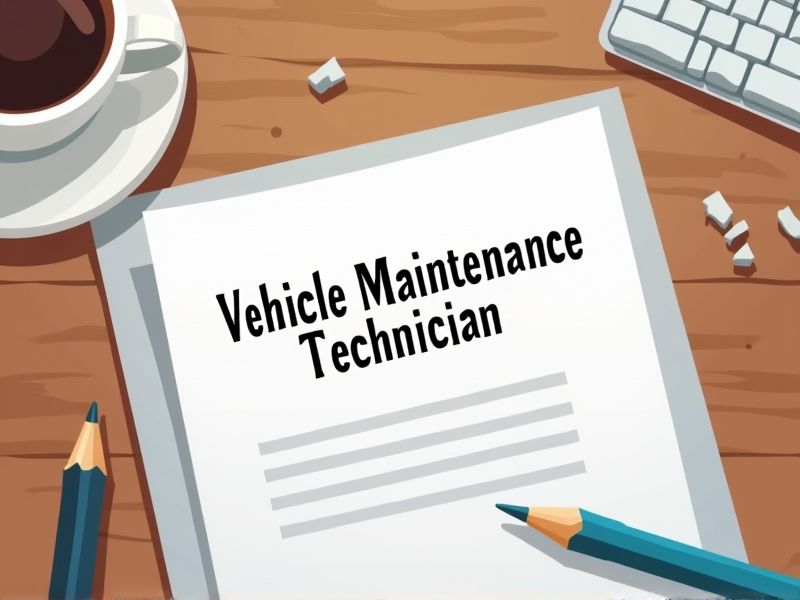
Vehicle Maintenance Technicians work with complex systems that require specialized knowledge to ensure safety and efficiency. Certifications verify their skills in handling advanced diagnostic tools and staying updated with the latest automotive technologies. Ensuring a standard of expertise, these certifications often lead to better job opportunities and career growth in the industry. Here are some critical certifications you may seek as a Vehicle Maintenance Technician.
ASE Engine Repair Certification
ASE Engine Repair Certification ensures that vehicle maintenance technicians possess the necessary skills to accurately diagnose and repair engine problems. This certification reassures employers and customers of a technician's capability and knowledge. Technicians with this certification tend to reduce the likelihood of repeat repairs, saving time and cost. Data shows that certified technicians often experience better job opportunities and career advancement.
ASE Automatic Transmission Certification
The ASE Automatic Transmission Certification is crucial for Vehicle Maintenance Technicians because it verifies their expertise in diagnosing and repairing transmission systems, ensuring high-quality service. With advancements in vehicle technology, this certification highlights a technician's commitment to staying updated with industry standards. By obtaining this certification, technicians often command higher wages and greater job security, reflecting their specialized skills. Employers value this certification as it reduces the likelihood of costly errors and enhances customer trust and satisfaction.
ASE Suspension & Steering Certification
The ASE Suspension & Steering Certification is necessary because it validates a technician's expertise in diagnosing and repairing suspension systems, which are critical for vehicle safety and stability. This certification ensures that technicians have a standardized level of skill, reducing the risk of improperly handled repairs that might lead to accidents. Employing certified technicians enhances a shop's credibility and trust among customers, leading to increased business. Many employers prefer or require certification as it indicates a commitment to ongoing education and excellence in the field.
ASE Brake Systems Certification
ASE Brake Systems Certification ensures technicians possess necessary skills to diagnose and repair brake systems accurately. Employers often seek certified technicians, resulting in increased job opportunities. Incorrect brake repairs can lead to accidents, so certification promotes safety. Certification serves as a benchmark for industry standards, encouraging consistent high-quality service.
EPA Section 609 Certification
EPA Section 609 Certification is mandatory for vehicle maintenance technicians to ensure they can legally handle refrigerants used in automotive air conditioning systems. This certification aligns with the Clean Air Act, aiming to minimize emissions and environmental impact from refrigerant gases. Without proper certification, technicians can face legal penalties, which can affect their employment and business operations. Certification requirements ensure that technicians are trained in the responsible management and recycling of refrigerants, promoting safer environmental practices in automotive services.
I-CAR Structural Repair Certification
I-CAR Structural Repair Certification ensures that vehicle maintenance technicians have the skills to perform complex repairs on modern vehicles, as they often require precise techniques due to advanced materials and designs. Manufacturers frequently use high-strength materials and intricate safety systems, making it crucial for technicians to understand the specific repair standards to maintain vehicle integrity. Consumers trust technicians with this certification, which enhances customer satisfaction and potentially increases business for shops. Insurance companies often require certified technicians for repairs, facilitating smoother claim processes and ensuring compliance with industry standards.
ASE Diesel Engine Certification
ASE Diesel Engine Certification ensures that a technician has the necessary skills and knowledge to efficiently diagnose and repair complex diesel engine systems. Possessing the certification can enhance a technician's credibility and trustworthiness among employers and clients, potentially leading to better job opportunities and higher pay. Diesel engines have specific maintenance requirements that differ from gasoline engines, so the certification is crucial for understanding these unique aspects. Certified technicians contribute to improved vehicle safety and performance, which can directly impact overall customer satisfaction and retention for service providers.
Hybrid & Electric Vehicle Technician Certification
The certification equips technicians with specialized skills to handle the unique components of hybrid and electric vehicles. As the adoption of these vehicles increases, certified technicians become essential to safely manage their distinct systems and technologies. Employers seek certified personnel to ensure compliance with industry standards and reduce liability. Technicians with certifications often command higher wages due to their proven expertise and updated knowledge.
Automotive HVAC Systems Certification
Automotive HVAC systems certification ensures that vehicle maintenance technicians possess the necessary knowledge and skills to work with increasingly complex climate control technologies. Certified technicians can effectively diagnose and repair HVAC systems, reducing the risk of prolonged vehicle downtime and ensuring passenger comfort. Proper HVAC system maintenance also directly impacts fuel efficiency and lowers the emission of environmentally harmful refrigerants. Certified technicians are more trusted by employers and customers, which can lead to increased job opportunities and career growth.
OEM Manufacturer Training Certification
OEM Manufacturer Training Certification ensures technicians understand specific vehicle make and model intricacies, leading to more accurate diagnostics and repairs. Better familiarity with proprietary technology enhances service efficiency and quality. Certification translates to increased trust from customers seeking specialized expertise. Repair shops with certified technicians often experience reduced liability risks due to adherence to manufacturer-endorsed procedures.
Summary
When you obtain certifications as a Vehicle Maintenance Technician, you enhance your credibility and skillset. This typically leads to increased employment opportunities and higher earning potential. Employers often prioritize certified technicians for complex tasks, recognizing their reliability and expertise. Your career progression and job satisfaction are likely to improve as a result.
